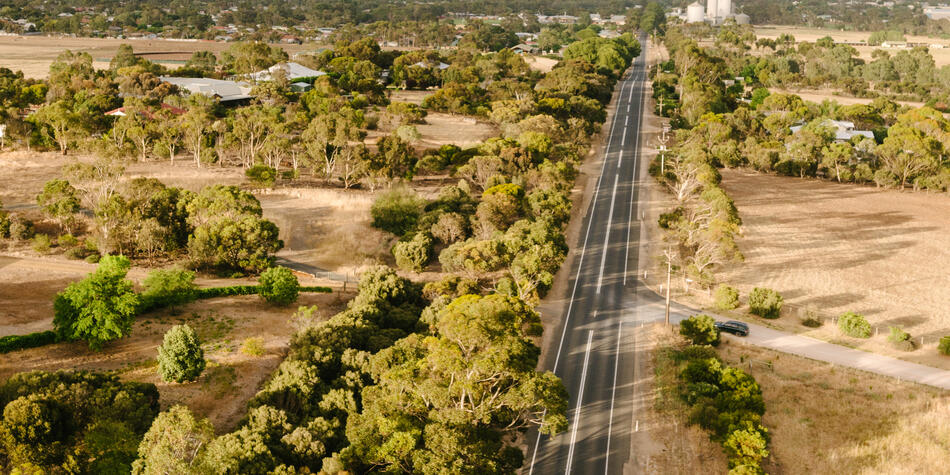In entertainment, doctors are generally depicted as frenetic creatures in fluoro-lit, city hospitals. It would be easy to think that this is the only direction to take your medical career. But what about regional and rural doctors? We spoke to two Deakin graduates about their decision to seek careers away from the hustle and bustle. Hint: it has something to do with healthy work-life balance.
It’s no secret that medical careers can be highly stressful. The prevalence of mental health issues in doctors is an ongoing cause for concern. But this doesn’t have to be the only way. Dr Michael Jones is a GP in Ballarat and he’s found that living outside of the city allows for a deep sense of work-life balance – something not all medical practitioners get to experience.
I get to do what I really enjoy but can still have a great lifestyle, without too much time on call or after hours,’ he says. ‘I get to spend plenty of time with my family and we get to live on a bush block with all the fun that that entails.
Dr Michael Jones
Career and life combined
Once the country is under your skin it’s hard to consider anything else. ‘Having grown up in the rural, central Victorian town of Castlemaine I have always liked the country feel and always saw myself moving back to a rural area after I finished my medical training,’ Michael says. ‘It truly is a beautiful thing to be able to live on 14 acres and be just 10 minutes out of the centre of town and have a 20 minute commute to work.’
Dr John Oxford has practised in a number of rural communities throughout his years as a student and beyond. ‘I’ve been embraced by rural communities including Portland, Hamilton, Timboon, Colac in Victoria and Longford, Perth, Geevston, Huonville, Cygnet and Franklin in Tasmania,’ he says. ‘The city was never really my cup of tea. Don’t get me wrong, we can’t do without our city counterparts in the big hospitals and the crazy, super, sub-specialties but I could never really feel at home in those places.’
Unique work opportunities
One misconception about working in a regional or rural area is that you might be exposed to fewer challenges than you would in urban areas. In reality the opposite is true. ‘You get to do a lot,’ explains Michael. ‘You get to manage a lot of chronic diseases and things that might be managed by specialists in the big cities, because there are fewer specialists in smaller areas.’
As a student doctor, John was surprised by the scope of experiences available to him in rural communities: ‘In my third year as a student I lost count of the number of lumbar punctures I did. I put a cannula in a very sick two year old as there wasn’t anyone else around that could do it. I stitched a guy’s arm back together for three hours after he had an argument with a chainsaw.’
Delivering babies became the norm for John, as did assisting on caesarean sections. In one role he found himself running the small emergency department in town. He was told by his supervisor that he no longer needed to log his experiences in his student logbook because he had well and truly exceeded his course requirements. ‘I didn’t have to add anything else to the 750 things that were in my logbook by two thirds of the way through the year,’ he explains.
The one thing I told myself again and again as I was going through university was to be open to mostly anything and see where it took me.
Dr Michael Jones
Community and connection
While city life may appeal to those who thrive on anonymity, practicing regionally or rurally allows you to make genuine connections. ‘It’s easier to feel connected to the community,’ Michael says. ‘Even though I’m in Ballarat with a population of 100,000 people, it still feels like a small town at times. I regularly bump into people down the street or at community events that I know both professionally and personally.’
John found the same as he’s moved through rural areas for his rounds. ‘Warm welcoming community, brilliant educators and a never ending stream of patients that not only wanted me to be involved in their care but often dropped off some carrots or beetroots at the surgery when they have too many of at home,’ he says, summing up his experience.
Michael says that people who write off the country as being boring are missing out: ‘Ballarat is only an hour from Western Melbourne and there is plenty to do here. There are great schools, great people and you get to do a whole lot that you might not be able to do in a big city setting.’
The opportunities are amplified the more remote you go. ‘If you want to go even more rural then you would get to do even more exciting things,’ Michael says. ‘You can have a great lifestyle, you aren’t stuck in traffic jams for an hour or more, you have access to most things that the big cities offer and the people are friendly and genuine.’
Keeping an open view of what a medical career can look like is one way to ensure an exciting and unpredictable career. ‘It’s certainly been an entertaining ride so far and it still feels like I’m only just getting started,' John says.
Inspired to make a powerful difference to the lives of those in regional Australia? Find out how studying medicine at Deakin can help you realise that goal.

